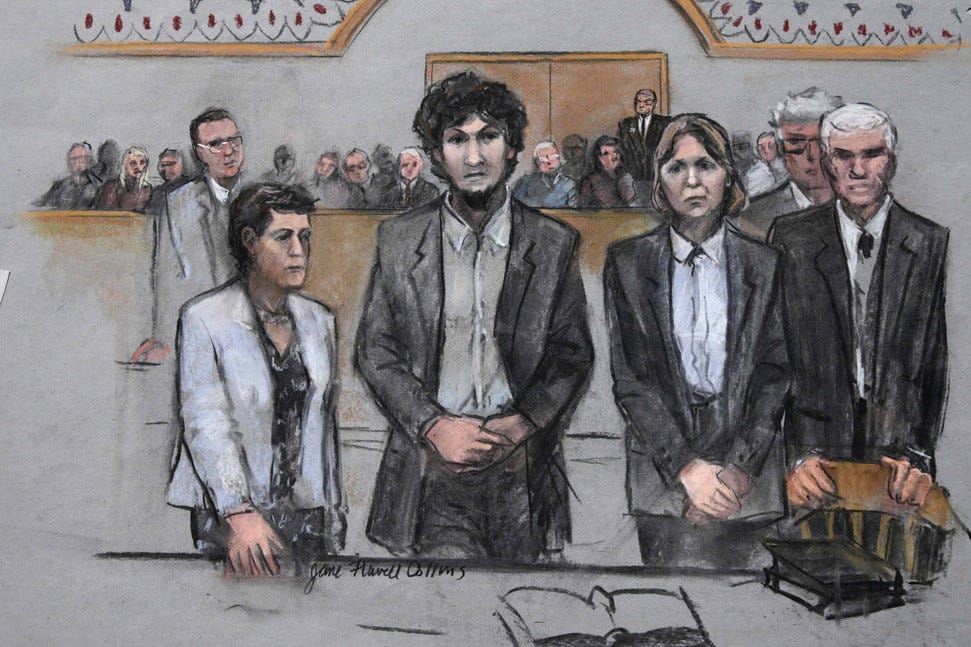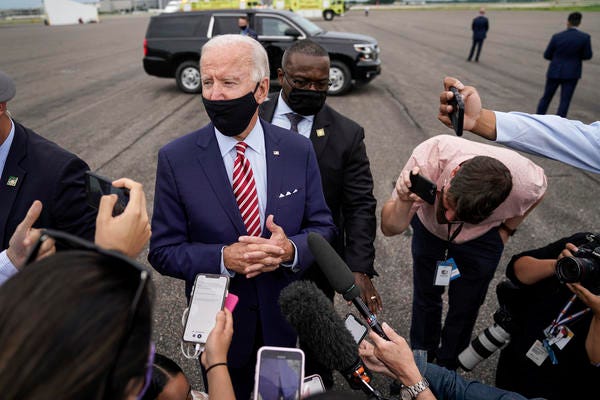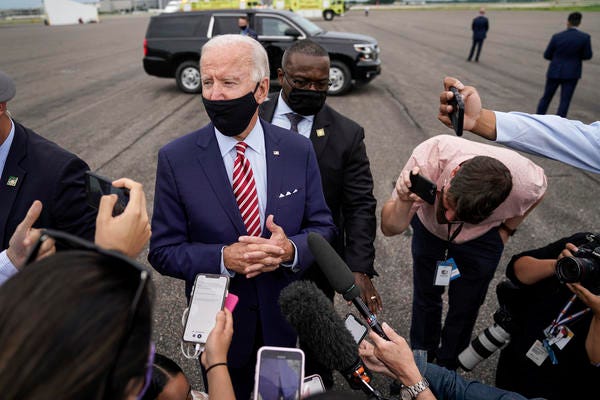Good morning! It’s Thursday, March 25, 2021. Election Day 2022 is 593 days away. Election Day 2024 is 1,321 days away.
What to expect at Biden’s first press conference
President Joe Biden will hold his first press conference since taking office at 1:15 p.m. Eastern Time today. Biden has been in office for 65 days, making this the longest time a president has waited to hold a formal session with reporters since the administration of Calvin Coolidge, who was known as “Silent Cal,” more than 100 years ago.
According to the Atlantic, the historically long wait has been a “strategic bet” by the Biden team. “It’s a conscious calculation that people don’t need—or want—to hear from the president on an hour-by-hour basis, that they will be satisfied if he can revive the economy and end the pandemic,” the magazine reported. Even after the campaign is over, Biden and his aides are seeking to strike a contrast with former President Donald Trump, hoping to let their flurry of actions speak for itself and make the man in the Oval Office more of a secondary character than an in-your-face leader.
Then, of course, there is the issue of the gaffes. Over his long political career, Biden has been known to sumble over his words and make his share of verbal miscues — giving his aides all the more reason to occasionally shield him from the public. Just as in the 2020 campaign, it’s an approach that’s paid dividends: Biden’s “basement strategy” was successful in allowing Trump’s words to gain attention while the Democrat remained behind the scenes; so far in his presidency, he has spent much less time than Trump in front of cameras but has accrued a 54% approval rating, according to the FiveThirtyEight average. That’s higher than Trump ever reached in his four-year tenure.
That approval rating is a testament to Biden’s strategy of remaining out of the spotlight and focusing his energies on passing the $1.9 trillion American Rescue Plan, signing a record number of executive orders, and achieving his goal for the U.S. vaccination campaign. Those are the accomplishments that Biden will want to focus on today — but the topics of the press conference are up to the press, not the president.
And as Biden has discovered in his first 65 days, “there is no way to script the presidency.” So here are some of the less favorable aspects of his tenure that you can expect Biden to be grilled on this afternoon:
1. The border crisis. Migrants, especially unaccompanied minors, are continuing to stream into the United States at record numbers. Biden tapped Vice President Kamala Harris to lead the administration’s response to the crisis on Wednesday, but that will not stop the issue from likely being the top one Biden is asked about today. Related problems include the question of whether Biden’s own immigration policies are related to the migrant surge, the question of the limited access that the press has had to border facilities, and whether Biden will take in as many refugees as he promised — which some Democrats are pressing him on.
2. Gun violence. There have been two mass shootings in the past two weeks. Will Biden take executive action on gun control? Does he believe universal background checks and an assault weapons ban — which he called for on Tuesday — have any chance at passage in Congress? As outlined in Wednesday’s newsletter, the odds of legislative action on the issue seem low, but there is intense pressure from activists for Biden and congressional Democrats to act after years of rising gun deaths.
3. Intraparty tensions. Biden is at the center of Democratic Party squabbles on a few fronts. First, there is the question of whether he will push the party to eliminate the Senate filibuster to ease passage of his agenda, as some lawmakers are pushing. Then there is a dispute with Asian-Americans in his party, who are upset at their of lack of representation in the administration. Those tensions bubbled to the surface this week when two Democratic senators said they would block Biden nominees over the diversity issue; that threat seems to have been diffused for now, but it served as a fresh reminder of the perils that a 50-50 Senate can present for Biden.
Oh, and a few more: Andrew Cuomo, whose political future is increasingly dim and who faced a new report last night that he gave his relatives special access to Covid testing. North Korea, which tested two short-range missiles this week in a shot across the bow at the United States. China, after a tension-filled meeting with Biden advisers and officials from Beijing last week.
In short, there should be plenty to talk about. Will Biden keep his cool under fire, or will he revert to his old gaffe-prone ways? The press conference will stream here at 1:15 p.m. — and I’ll have a full summary for you in tomorrow’s newsletter.
Share with friends, win rewards
I’m committed to keeping Wake Up To Politics completely free and growing only be word of mouth. But to do that, I need your help. Now you can help share WUTP and win cool prizes at the same time.
Below, find your unique referral link: if three of your friends sign up using the link, you’ll get access to an exclusive Zoom Q&A session with Gabe and other members of the WUTP news team! If 10 friends sign up, you’ll get a free WUTP mug. Thanks so much for your help sharing the newsletter!
Your unique referral link: *|RH_REFLINK|*
Or click here to share directly to Twitter, Facebook, or email.
Legal Roundup
Contributed by Anna Salvatore
During oral arguments on Tuesday, the Supreme Court appeared willing to overturn a California law that lets union organizers enter worksites. Two California farmers claimed that the 1975 law — which was promoted by the late activist César Chávez — violated their 5th Amendment rights, as they had to surrender access to their land without compensation. At least five of the justices seemed to agree that the law stretched too far.
Yet they also searched for middle ground, with Justice Breyer saying that a broad ruling for the growers could affect “dozens and dozens and dozens” of other laws. Justice Kavanaugh then suggested that the unions rely on an old Supreme Court case, NLRB v. Babcock & Wilcox, to give them access to worksites in reasonable and limited circumstances. A narrow win for the California growers is expected.

The justices also agreed Monday to review the death sentence of Boston Marathon bomber Dzhohkar Tsarnaev. Last summer, a lower court overturned Tsarnaev’s sentence because at least two of his jurors failed to fully disclose what they knew about his case. “The [justices] always have the same two options: affirm or reverse,” Harvard Law professor Carol S. Steiker commented to the Boston Globe. “They could affirm the Court of Appeals, in which case the order for a new sentencing trial would stand. Or they could reverse, in which case Tsarnaev’s death sentence would remain undisturbed.” The Supreme Court will likely hear arguments for this high-profile case in the fall.
The Senate held its first hearing on Wednesday on a wide-ranging elections bill. Sponsored by Democrats, the For the People Act would create new campaign finance rules, restructure the Federal Election Commission, and outlaw partisan gerrymandering in congressional districts. The hearing turned fractious amid rare appearances from both Senate leaders.
In June 2019, the Supreme Court said that courts cannot overrule a districting map that’s expressly designed to benefit a political party. Congress does have that power, though, and Democrats are eager to stop partisan gerrymandering before Republican statehouses can create right-leaning districts later this year. The new legislation passed in the House earlier this month, but is expected to stall in the Senate.

More legal headlines:
Next term, the Supreme Court will decide whether women should have to sign up for the Selective Service draft. The New York Times notes that “almost all other sex-based distinctions in federal law have been eliminated, in no small part because of the pioneering work of Justice Ginsburg.”
The Supreme Court declined Monday to hear Facebook’s appeal of a lower court ruling which ordered the company to pay $15 billion for violating the WireTap Act.
Remember Jack Phillips, the Masterpiece Cakeshop baker who refused to make cakes for same-sex weddings? He is back in court, the ABA Journal reports — this time because he claims that decorating a cake for a gender transition would violate his religious beliefs.
What is the “shadow docket”? Reuters explains the justices’ practice of releasing quiet, accelerated rulings on issues like the death penalty.
The 2nd Circuit ruled last Thursday that an Occupied Wall Street protester who was beaten by police is entitled to a new trial.
The 8th Circuit ruled that school administrators at the University of Iowa improperly interfered with a religious group on campus.
Ask Gabe
Q: What is the “Charleston loophole”? — Pam R. of Chicago, IL
A: This came up in Wednesday’s item on gun control proposals. Under current federal law, the FBI has three days to conduct a background check on a potential gun buyer; if that time elapses before the background check is done, the gun seller is allowed to go ahead and sell the firearm. This is known as the “Charleston loophole” because it is how Dylann Roof obtained the gun that he used to kill nine people at a Charleston, South Carolina, church in 2014.
Because of a past drug charge, Roof should not have been able to buy the weapon, but the sale went through because the FBI did not alert the seller within three days. According to federal data obtained by the gun control group Everytown for Gun Safety, there were almost 6,000 instances of this happening in the U.S. in 2020. (If the FBI finds out after the three days that a sale should not have gone through, the agency refers the case to the Bureau of Alcohol, Tobacco, Firearms, and Explosives.)
H.R. 1112, which would close the “Charleston loophole” by extending the background check waiting period from three days to 10, passed the House last month but is not expected to receive 60 votes in the Senate. As mentioned on Wednesday, the Manchin-Toomey gun control measure (which could be brought back in this Congress) would also close the loophole.

Q: In your newsletter on Monday, you mentioned statehood the D.C. statehood movement. What about statehood for Puerto Rico? I know they voted in 2020 for statehood, has there been any action taken? — LaDonna H. of St. Louis, MO
A: While D.C. statehood has near-unanimous support among Democrats on the Hill at this point, the party is more fractured when it comes to Puerto Rico, partly because the territory itself has sent mixed signals. Puerto Rico voters narrowly backed a non-binding statehood referendum in 2020, 52%-48%, but past referenda were either rejected or produced muddled results.
There are a few bills that have been introduced to address the issue. The Puerto Rico Statehood Admissions Act, which would add Puerto Rico to the union, has support from 43 Democrats and 14 Republicans in the House, and 3 Democrats in the Senate. (The D.C. statehood bill has 215 backers, for comparison.)
Then there is the Puerto Rico Self-Determination Act, which would create a “status convention” made up of Puerto Rico delegates, who would come up with a long-term solution (statehood, independence, or another option) which would then be voted on in the territory’s first federally-recognized referendum. Rep. Alexandria Ocasio-Cortez (D-NY) is one of the prominent backers of the proposal, which has 77 Democratic co-sponsors across the two chambers and one Republican backer in the Senate.
The For the People Act, the Democrats’ signature democracy reform package, also touches on the issue: it would create a task force to consider offering full voting rights in Congress and presidential elections to U.S. territories, including Puerto Rico. H.R. 1, as this package is known, passed the House earlier this month and is now before the Senate; no action is expected on the more Puerto Rico-focused proposals in the near future, as sympathetic lawmakers hash out whether to push for immediate statehood or another referendum.
Do you have a burning question about politics? Send it over to gabe@wakeuptopolitics.com and it might get answered in the newsletter! Don’t forget to include your first name and where you’re from.
Daybook
All times Eastern.
Executive Branch
President Joe Biden will receive the President’s Daily Brief at 9:30 a.m. Then, at 1:15 p.m., he will hold his first formal press conference since taking office. Finally, at 3:45 p.m., he will meet virtually with leaders from the European Union as part of a European Council summit.
— Vice President Kamala Harris and Second Gentleman Doug Emhoff will participate in a virtual Passover celebration at 5:50 p.m.
Legislative Branch
The Senate will convene at 10 a.m. Following Leader remarks, the chamber will proceed to consideration of H.R. 1799, which would extend the Paycheck Protection Program (PPP) — a pandemic-era loan program for small businesses — through May 31. It is currently slated to expire on March 31. The Senate will vote at 10:45 a.m. on an amendment by Sen. John Kennedy (R-LA), followed by another by Sen. Marco Rubio (R-FL), and then on a motion to waive the Budget Act after an expected point of order against the bill by Sen. Rand Paul (R-KY).
Finally, the chamber will vote on passage of the measure, which will require 60 votes because of its budgetary impact. The bill already passed the House in a 415-3 vote and is expected to receive bipartisan support.
After the PPP bill is passed, the Senate is expected to vote on confirmation of Deputy Treasury Secretary nominee Adewale Adeyemo. The chamber could also vote on passage of H.R. 1868, a House-passed bill that would waive the American Rescue Plan from triggering automatic spending cuts to Medicare, Medicaid, and other programs under the Statutory Pay-As-You-Go Act of 2010.
— The Senate Homeland Security Committee will hold a confirmation hearing at 10:15 a.m. for FEMA Administrator nominee Deanne Criswell.
The House is not in session.
— The House Transportation and Infrastructure Committee will hold a hearing at 11 a.m. with Transportation Secretary Pete Buttigieg on the Biden administration’s infrastructure priorities.
— The House Agriculture Committee will hold a hearing at 12 p.m. with Agriculture Secretary Tom Vilsack on the state of Black farmers in the U.S.
— The House Energy and Commerce Committee will hold a hearing at 12 p.m. with the CEOs of Twitter, Facebook, and Google on “social media’s role in promoting extremism and misinformation.”
— The House Veterans’ Affairs Committee will hold a hearing at 2 p.m. with Veterans Affairs Secretary Denis McDonough on his agency’s COVID-19 response and progress made at the VA during the Biden administration’s first 100 days.
Judicial Branch
The Supreme Court is expected to release opinions at 10 a.m.
Thanks for waking up to politics! If you enjoy reading this newsletter, I’d be so grateful if you’d consider donating to help support me and my work. If you want to show off your support for Wake Up To Politics, you can also buy some merchandise.
Also: don’t forget to tell your friends and family to sign up for the newsletter at wakeuptopolitics.com. And if you have any questions or comments, feel free to email me at any time.







